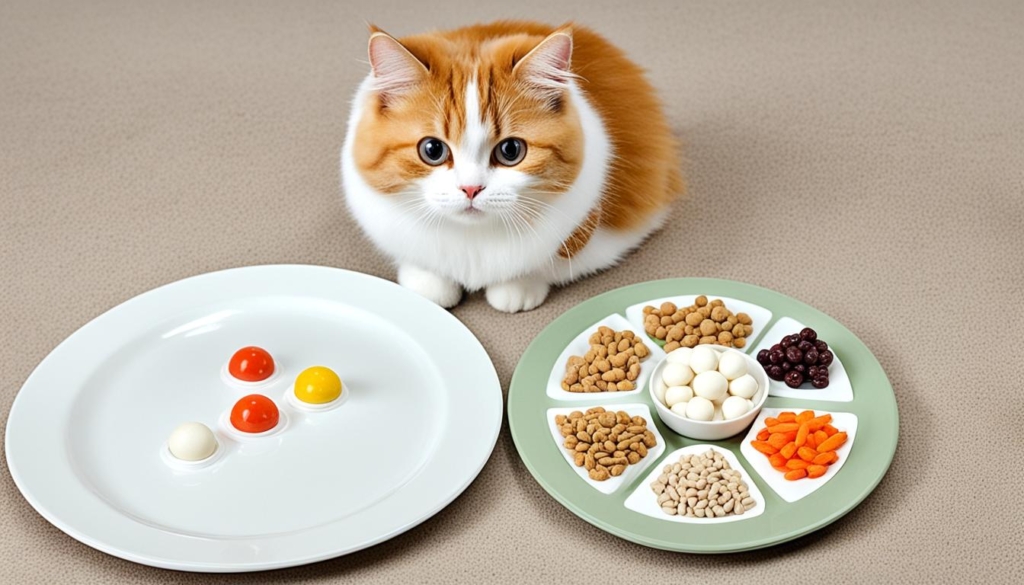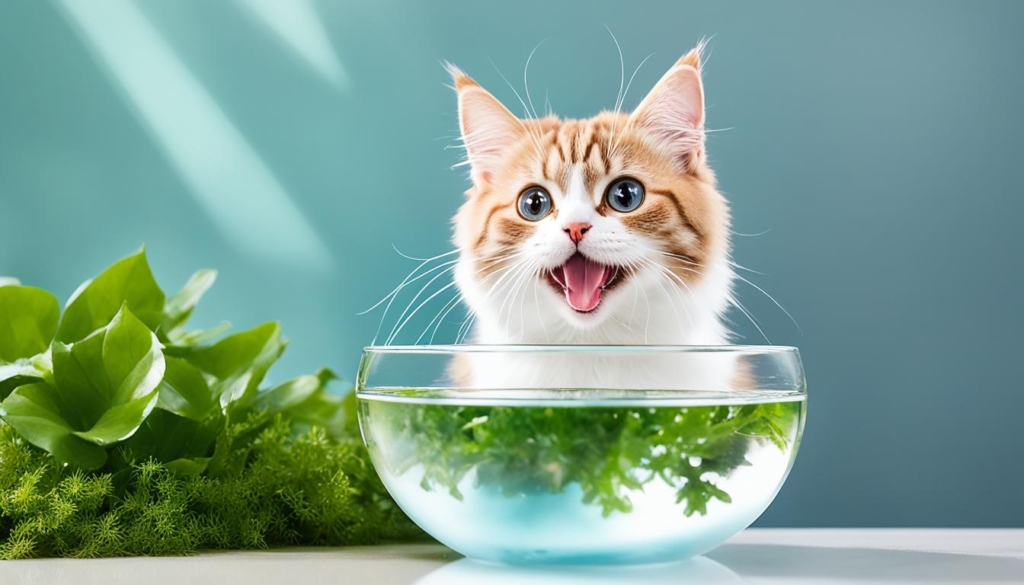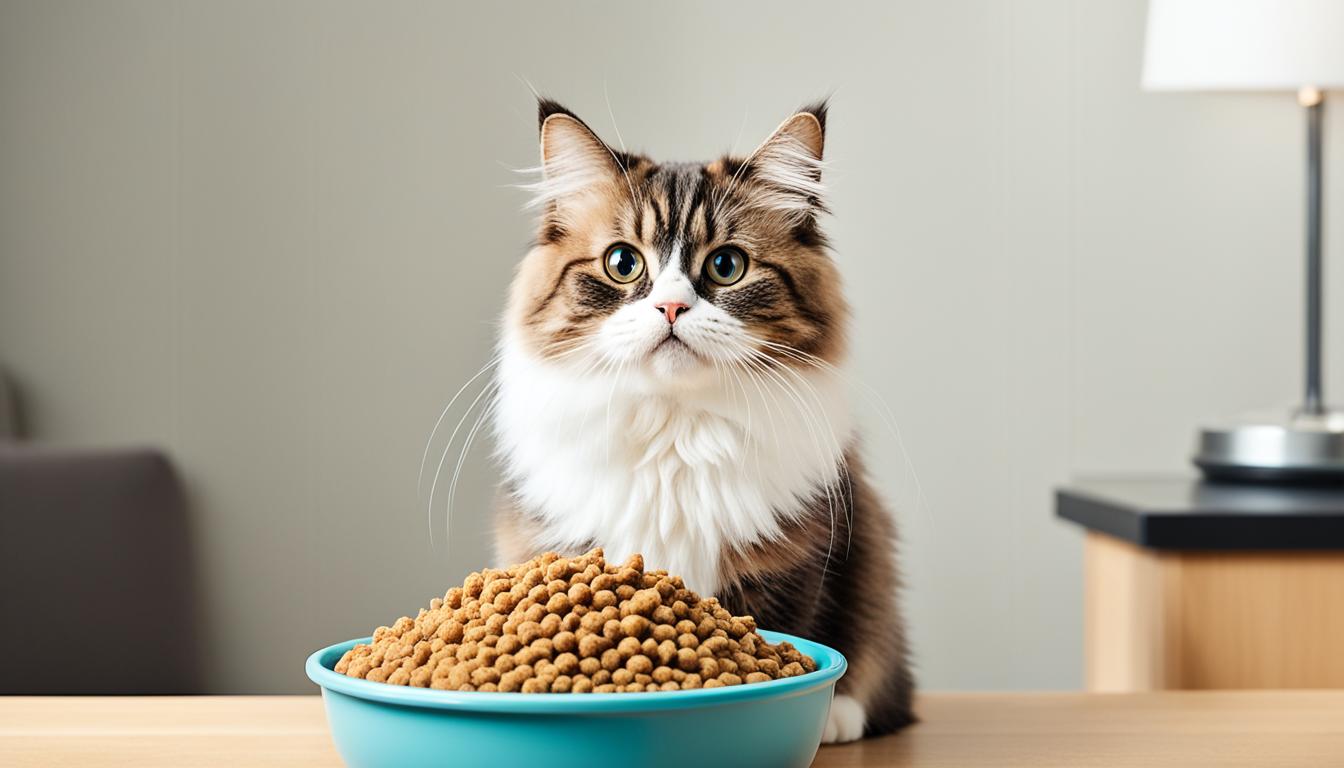The Munchkin cat, renowned for its charming short legs and lively personality, has unique nutritional needs that require special attention. While Munchkins can thrive on the same diet as regular cats, their diminutive size and active lifestyle necessitate a tailored approach to feeding. Providing the right amount and type of food is crucial to maintaining a Munchkin cat’s optimal health and preventing weight-related issues.
Key Takeaways
- Munchkin cats generally weigh between 6-9 pounds and have an average lifespan of 12-15 years.
- Veterinarians recommend feeding Munchkin cats a mix of wet food and dry kibble to meet their nutritional requirements.
- Munchkin cats should be fed measured meals two to three times a day to prevent obesity.
- Adult Munchkin cats typically require 3–4 ounces of wet food or 1/4–3/4 cups of dry food per day, with at least 30% of their diet consisting of protein.
- Munchkin cats are prone to urinary tract problems, emphasizing the importance of adequate hydration and the recommendation of wet food.
Understanding the Unique Nutritional Needs of Munchkin Cats
Munchkin Cat Breed Overview
The Munchkin cat is a unique breed recognized for its short legs, which are the result of a natural genetic mutation. Despite their diminutive stature, Munchkins have average-sized bodies, typically weighing 6-9 pounds. Munchkins are known for their playful, friendly, and kitten-like personalities throughout their lives.
Energy Requirements and Activity Levels
Munchkin cats are highly active and energetic, requiring more calories to fuel their playful behavior and high activity levels. They tend to be confident, outgoing, and enjoy exploring their environment. Munchkins are often described as dog-like, with a tendency to follow their owners around and seek attention. Their energy needs should be taken into account when determining appropriate food portions and feeding schedules.
| Age | Weight Range |
|---|---|
| 3 months | 3-5 pounds |
| 6 months | 4-6 pounds |
| 9 months | 5-8 pounds |
| 12 months | 6-8 pounds |
Munchkin cats typically grow to be 6-8 pounds and 5-8 inches in height. They generally stop growing by the age of 2 years old. Proper nutrition is crucial for the growth and development of Munchkin cats.
Regular exercise can help maintain a healthy weight for Munchkin cats, as they are prone to obesity due to their high energy requirements and tendency to be confident, outgoing, and enjoy exploring their environment. Monitoring factors affecting the size of Munchkin cats, such as genetics, nutrition, and lifestyle, is essential for their overall well-being.
Choosing the Right Cat Food for Your Munchkin
When it comes to feeding your Munchkin cat, you have a variety of options to consider. Munchkins can thrive on both wet cat food and dry cat food, each offering unique benefits. Wet food is often recommended for Munchkins as it provides more moisture, which is crucial for their urinary tract health. On the other hand, dry cat food is more convenient and can be left out for longer periods without spoiling.
To determine the best food for your Munchkin, consider factors like their individual Munchkin cat food preferences, hydration needs, and the overall convenience of the feeding method. Some Munchkins may prefer the taste and texture of wet food, while others may enjoy the crunch and accessibility of dry kibble.
Kitten vs. Adult Food
Kitten food for Munchkin cats is specially formulated to meet the unique nutritional needs of growing Munchkin kittens. These diets provide the extra calories, proteins, and nutrients required for their rapid development. As your Munchkin reaches adulthood, around one year of age, you can transition them to an adult cat food formula that is appropriate for their life stage and activity level.
By carefully selecting the right cat food for Munchkins, you can ensure your furry friend receives the balanced nutrition they need to thrive. Remember to consult with your veterinarian for personalized recommendations based on your Munchkin’s individual needs and preferences.
Portion Sizes and Feeding Guidelines
Daily Caloric Intake for Munchkins
The recommended daily caloric intake for Munchkin cats typically ranges from 40 to 45 calories per kilogram of body weight. For an average adult Munchkin weighing 3 to 4 kilograms, this translates to approximately 192 to 280 calories per day. However, the exact portion size will depend on factors such as the Munchkin’s age, activity level, and individual nutritional needs.
It’s important to follow the feeding guidelines on the cat food label and consult your veterinarian to determine the appropriate portion size for your Munchkin cat. Kittens, for instance, may require 2 to 3 times the daily caloric intake of an adult Munchkin due to their higher energy requirements for growth and development.
| Cat Life Stage | Daily Caloric Intake (kcal) |
|---|---|
| Kitten (6 months to 18 months) | 250-280 kcal |
| Adult (1-7 years) | 200-300 kcal |
| Senior (8+ years) | 180-220 kcal |
It’s essential to monitor your Munchkin’s body condition and adjust the portion sizes accordingly to prevent obesity, which can lead to various health issues. Consulting your veterinarian regularly and following the recommended Munchkin cat feeding guidelines will help ensure your feline friend maintains a healthy weight and receives the proper nutrition.

How much food should a Munchkin cat eat?
Determining the proper food portions for your Munchkin cat is essential to maintaining their health and well-being. As a general guideline, adult Munchkin cats typically require 3-4 ounces of wet food or 1/4-3/4 cups of dry food per day, divided into 2-3 meals.
However, the exact amount of food your Munchkin cat needs can vary based on several factors, including their weight, age, activity level, and individual dietary requirements. It’s important to carefully follow the feeding instructions on the cat food label and consult your veterinarian to determine the optimal portion size for your Munchkin cat.
Munchkin cats are known for their unique physique, with short legs and a long body, which can impact their nutritional needs. Munchkin cats are generally healthy but are prone to certain hereditary conditions like lordosis and pectus excavatum, which may require specialized dietary considerations.
To ensure your Munchkin cat receives the right balance of nutrients, it’s recommended to choose a high-quality cat food formulated specifically for their breed and life stage. This can help meet their specific energy requirements and support their overall health and well-being.
Remember, the feeding guidelines on the cat food label should be used as a starting point, and you may need to adjust the portions based on your Munchkin cat’s individual needs. Regular monitoring of their weight and body condition, as well as consultation with your veterinarian, can help ensure your Munchkin cat is receiving the right amount of food to thrive.
Feeding Schedule and Routines
Maintaining a consistent Munchkin cat feeding schedule and routine is essential for the well-being of these unique feline companions. Munchkin cats thrive on predictability, and establishing a regular feeding pattern can help regulate their digestive system and prevent unwanted weight gain.
Experts recommend feeding Munchkin cats multiple smaller meals throughout the day, rather than leaving food available for free-feeding. This approach not only ensures they don’t overindulge but also helps maintain a healthy Munchkin cat feeding routine. Feeding your Munchkin cat at the same times each day, ideally 12 hours apart, can help establish a consistent Munchkin cat meal frequency and prevent any disruptions to their natural rhythms.
| Munchkin Cat Age | Recommended Feeding Frequency | Daily Caloric Intake |
|---|---|---|
| Newborn to 4 weeks | Every 3-4 hours | Depends on body weight |
| 4 to 8 weeks | Every 4-6 hours | 250-360 calories |
| 8 weeks to 4 months | 2-3 times per day | 60-65 calories per pound |
| 4 months to 10 years | 2-3 times per day | 30-40 calories per pound |
By adhering to a consistent Munchkin cat feeding schedule and routine, you can help your feline friend maintain a healthy weight, regulate their digestion, and enjoy a harmonious relationship with their beloved caretaker.
“Establishing a predictable feeding routine is crucial for the overall well-being of Munchkin cats. Consistency is key to keeping them happy, healthy, and at their optimal weight.”
Hydration and Water Intake
Importance of Water for Munchkin Cats
Adequate hydration is crucial for Munchkin cats, as they are prone to urinary tract issues. Providing fresh, clean water at all times is essential for maintaining their overall health and preventing urinary problems. Munchkin cats, like all felines, require a specific amount of water intake to function properly.
The average adult cat needs to drink at least 50 to 70ml of water per kilo of body weight daily. However, most cats, including Munchkins, often drink less than the required amount or stop once their daily requirement is met. This can be attributed to the cat’s natural relationship with water, where they tend to avoid drinking completely.
Dehydration in Munchkin cats can result from various factors, such as urinary tract disorders, food poisoning, frequent urination, vomiting, and diarrhea. Signs of dehydration include dry gums, lethargy or depression, loss of appetite, decrease in skin elasticity, and elevated heart rate. Ensuring your Munchkin cat stays well-hydrated is crucial to their overall well-being.
Wet food can also help increase your Munchkin’s water intake, as it contains a higher moisture content compared to dry kibble. Placing multiple water bowls around the house, using a water fountain, and adding ice cubes to their food can also encourage Munchkin cats to drink more water.

| Age | Minimum Water Intake |
|---|---|
| Kittens under 4 weeks | No need to drink water |
| Kittens 4 weeks to 6 months | 70 ml per day |
| Grown Kittens | 135 ml per day |
| Adult Cats (4 kg) | 240 ml per day |
By ensuring your Munchkin cat stays well-hydrated, you can help support their overall health and prevent urinary issues. Remember, adequate water intake is crucial for Munchkin cats, just as it is for all feline companions.
Treats and Snacks for Munchkins
Treats and snacks can be a fun way to bond with your Munchkin cat, but they should not make up a significant portion of their diet. When it comes to Munchkin cat treats and Munchkin cat snacks, it’s important to choose low-calorie, high-quality options that are appropriate for your cat’s age and health needs.
Avoid feeding your Munchkin human foods, as many can be unsafe or unhealthy for cats. Instead, opt for healthy treats for Munchkin cats that are specifically formulated to meet their nutritional requirements. Remember, moderation is key when it comes to treats, as overfeeding can lead to weight gain and other health issues.
To ensure your Munchkin stays healthy and happy, consider incorporating the following types of treats and snacks into their diet:
- Freeze-dried meat or fish-based treats
- Low-calorie, grain-free biscuits or crunchy treats
- Catnip-infused toys or balls
- Cooked and unseasoned pieces of chicken or turkey
- Small amounts of plain, cooked sweet potato or pumpkin
Remember, the key to Munchkin cat treat selection is to choose options that are both enjoyable for your feline friend and supportive of their overall health and well-being.
| Treat Type | Benefits | Portion Size |
|---|---|---|
| Freeze-dried meat or fish | High in protein, low in carbs | 1-2 small pieces per day |
| Grain-free biscuits | Satisfying crunchy texture | 1-2 small biscuits per day |
| Cooked chicken or turkey | Lean protein source | 1-2 small pieces per week |
| Sweet potato or pumpkin | Fiber-rich, vitamin-packed | 1-2 teaspoons per week |
“Treats should never make up more than 10% of a cat’s daily caloric intake. It’s important to monitor portion sizes and choose healthy options to support your Munchkin’s overall wellbeing.”
Weight Management and Obesity Prevention
Maintaining a healthy weight is crucial for Munchkin cats due to their unique body structure and potential mobility issues. Obesity can exacerbate existing health problems and put additional strain on their bodies. Regular monitoring of your Munchkin’s body condition and adjusting their food portions as needed are essential steps to prevent weight gain and ensure their overall well-being.
Monitoring Body Condition
Regularly assessing your Munchkin cat’s body condition is key to managing their weight effectively. Here are some tips to help you monitor their weight:
- Gently run your hands along your cat’s sides, feeling for their ribs. You should be able to feel them, but they shouldn’t be visible.
- Check if you can see your cat’s waistline when looking down at them from above. A healthy Munchkin should have a noticeable waist.
- Look for a tucked-in abdomen when viewing your cat from the side. A sagging or protruding belly may indicate excess weight.
If you notice your Munchkin cat is gaining weight, consult your veterinarian for guidance on the ideal weight range and feeding recommendations to help them maintain a healthy size.
| Breed | Ideal Weight Range (lbs) |
|---|---|
| Munchkin | 4 – 9 lbs |
| Domestic Shorthair | 6 – 12 lbs |
| Persian | 7 – 14 lbs |
| Devon Rex | 6 – 9 lbs |
| Sphynx | 6 – 12 lbs |
| American Shorthair | 7 – 12 lbs |
| British Shorthair | 9 – 18 lbs |
| Maine Coon | 8 – 20 lbs |
Remember, the key to maintaining a healthy weight for your Munchkin cat is to monitor their body condition regularly and adjust their food intake accordingly, in consultation with your veterinarian. By doing so, you can help prevent Munchkin cat obesity and ensure they enjoy a long, active, and comfortable life.
Conclusion
Providing the right amount and type of food is essential for the health and well-being of Munchkin cats. By understanding their unique nutritional needs, choosing appropriate cat food, and following proper feeding guidelines, you can help ensure your Munchkin cat stays happy, healthy, and at a healthy weight. Remember to consult your veterinarian for personalized advice on your Munchkin’s dietary requirements.
Munchkin cats require a balanced diet rich in high-quality proteins to support their muscle strength and energy levels. Additionally, proper hydration and monitoring calorie intake are crucial to prevent obesity, which can lead to various health issues. Collaborating with a veterinarian to develop a tailored feeding plan is recommended, as Munchkin cats may have specific dietary needs based on their size, activity level, and any underlying health conditions.
By following the guidelines and recommendations outlined in this guide, you can provide your Munchkin cat with the optimal nutrition to thrive. Remember to stay vigilant, adjust the feeding plan as needed, and prioritize the overall well-being of your feline companion.


